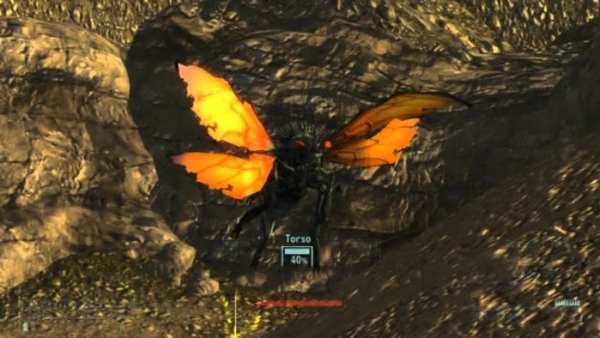If you have played The Outer Worlds, you are no doubt aware that it bears many similarities to Fallout: New Vegas, both having been developed by Obsidian Entertainment. While New Vegas is a nine-year-old game at this point, it has recently been added to Xbox Game Pass and is also available with PlayStation Now.
These are both definitely big games, so the investment of your time might be a problem, which one would be a more worthwhile time sink?
Story

Both Outer Worlds and New Vegas have a similar starting framework: you are a character with a mostly unimportant past given one important goal to strive towards while meeting characters along the way to help you accomplish it.
For New Vegas, the character you play as is a mystery, a (mostly) blank slate. All you know is that you were ambushed while on the way to deliver a package. You were shot in the head and left for dead, the injury robbing you of your memory. You are then informed that someone in the nearby bar might be able to help. Your main goal is to figure out what happened to you, and who took the package.
In The Outer Worlds you are awoken from cryo-sleep, having been one of many aboard the Hope, a colony ship headed for a new world. The problem is that the Hope never made it, and has been drifting for so long it has become urban legend. Phineas Welles, the scientist who awoke you, says that its dangerous to pull anyone out of cryo-sleep for as long as you have been, but has the right chemicals.
Problem is, Welles used all of the chemicals to bring you back and now needs you to find more. You are tasked with heading down to a nearby planet and linking up a smuggler hired by Welles.
While both games have the same ‘you are person, now go do thing’ attitude, New Vegas doesn’t offer quite enough in comparison. You are dropped into just about the middle of nowhere with a vague idea what your actual purpose is. There aren’t any stakes. With The Outer Worlds you are completely ignorant to this new corporate world order, but you know that your purpose is to save your people, and time is very much of the essence.
Winner: The Outer Worlds
Gameplay

Both New Vegas and Outer Worlds are the same breed of FPS-RPG. In both games you gain new gun after new gun because you are able to loot everything an enemy has on them. Neither do anything spectacularly different when it comes to the shooting side of gameplay. Both games don’t offer much strategy outside of shooting until their health bar is empty. However, where they diverge is the biggest divide between them.
New Vegas has the VATS system, a Pip-Boy given power to pause time and stack up shots against one or several of an enemy’s body parts, each with their own accuracy percentage. Once the player has set up their shots, time resumes and the game automatically fires for you.
The fact that VATS completely freezes time and doesn’t resume until you choose gives you a tactical advantage and allows you to plan. VATS lends a strategy element to New Vegas. Do you go for the head which has a 30% chance to land, or go for a limb that guarantees you do less damage?
The closest Outer Worlds gets to VATS is called Tactical Time Dilation (TTD) and is explained as a sort of brain damage your character has acquired due to cryo-sleep complications. As the name implies, TTD slows down time, giving you time to place a few shots while dodging enemy fire. The issue with TTD is that it uses a gauge for duration and it doesn’t feel nearly long enough when you are first starting to get used to it. TTD feels arguably forgettable without spending perk points to bulk it up.
The Outer Worlds was never going to stack up against VATS as it was something Obsidian obviously couldn’t copy if they were trying to make a game feel unique.
Winner: Fallout: New Vegas
RPG Elements

Fallout: New Vegas is a very direct RPG, and gives the player plenty of freedom to play around with. Your character levels up and gains new skills and with it becomes stronger with a host of ridiculous perks to carry you onward such as Friend of the Night where your character gains better vision in darkness. These perks are gained one every two levels and only get more wacky as the game progresses.
Leveling up in New Vegas means gaining points to put into skills directly such as leveling up small arms (pistols and such) or dialog things such as bartering. On top of this, when creating a character you are given the option to select certain traits that give a bonus on top of giving a negative, such as Built to Destroy, which gives a higher critical chance at the cost of weapon durability lowering at a faster rate.
The Outer Worlds follows a similar model as New Vegas with leveling up, but what it offers is a little more simple. While you still get perks every two levels, what is on offer is far more expected and far less silly, such as more carrying weight or increased health. However, there is a system that shares a passing resemblance to New Vegas’ traits: flaws.
A flaw can come about from, for example, being caught in too many explosions. These flaws offer a negative, like lowering stats, but you are instantly awarded a perk point that can change the tide in your favor if the odds are starting to stack up slightly. Fortunately, flaws can be declined, so you aren’t forced to punish yourself.
As strange as it is to say of an Obsidian Entertainment game, The Outer Worlds feels too grounded in comparison to New Vegas. Perks in New Vegas allow for silly occurrences, such as having the chance to fully obliterate an enemy on a critical strike. Perks in The Outer Worlds feels too rigid whereas New Vegas allows a loose freedom to grow your character in many different, and all weird, directions.
Winner: Fallout: New Vegas
Replayability

The Outer Worlds isn’t quite the same as a Fallout as far as exploration goes. The game gives a wide open area for the first planet, but it doesn’t give a whole host of locations to explore. As far as estimated playthrough time is concerned, simply going off of Twinfinite’s experience, Outer Worlds was completed in 40 hours.
However, this is 40 hours in a game where choice makes a huge difference, so it’s easy to imagine that a second playthrough could show you a whole new side to things. In a game that freely lets you be as bad or as good as you want, wouldn’t it be nice to see how the other side lives?
Fallout: New Vegas is harder to determine as far as time goes. The world is massive and feels like there is always something just to the west you haven’t yet seen. The Outer Worlds limits the character with just how far you can advance at a time, locking certain areas behind objectives, but New Vegas hands the player their freedom to simply beeline to the finish if they so desire. New Vegas has a more visible morality system where the player has a menu telling them how they are doing, giving better feedback on a future playthrough.
This is a harder section to award a winner to, because it’s tough to reason out what is the better option. Is it better for The Outer Worlds to be less dense but packed with choice for future playthroughs, or is the better option Fallout: New Vegas with its large population of locations to investigate so it feels like the game never ends?
Winner: Tie
Conclusion

As you can see comparing The Outer Worlds to Fallout: New Vegas is entirely fair and it borrows from its predecessor heavily. While in many cases everything that Outer Worlds takes it evolves into something even greater than the original, but there are also those certain things as detailed above that are toned down in the sci-fi space-faring romp.
For this reason, Fallout: New Vegas comes out ahead, and while it is the awesome bigger brother, it shouldn’t stop you from loving The Outer Worlds in any regard. While the point here is to give an idea of what you should play next if you haven’t played either, once you have run through the Mojave in New Vegas it is imperative that you slip into the many space suit(s) in The Outer Worlds and see an amazing developer enhanced a game that was a twinkling star of its generation.
Both games prove that Obsidian Entertainment is a master at crafting games that resonate with players, they might have had to leave some things on the table when it came from following up Fallout: New Vegas, but the new mold is sure to have some excitement coming.
